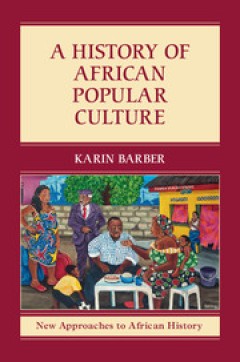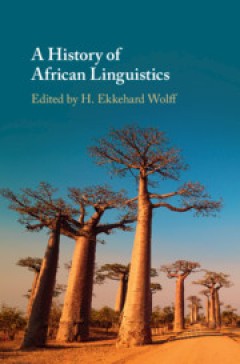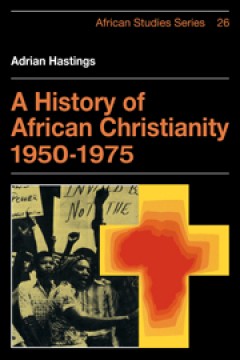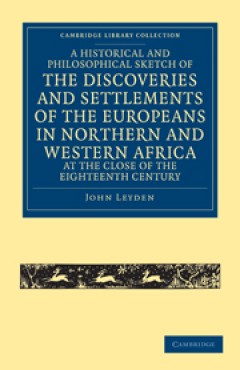Filter by

A History of African Popular Culture
Popular culture in Africa is the product of everyday life: the unofficial, the non-canonical. And it is the dynamism of this culture that makes Africa what it is. In this book, Karin Barber offers a journey through the history of music, theatre, fiction, song, dance, poetry, and film from the seventeenth century to the present day. From satires created by those living in West African coastal to…
- Edition
- -
- ISBN/ISSN
- 9781139061766
- Collation
- -
- Series Title
- New Approaches to African History
- Call Number
- -

A History of African Linguistics
Bringing together a team of leading scholars, this volume forms the first global history of African linguistics as an autonomous academic discipline, covering Africa, America, Asia, Australia, and Europe. Defining African linguistics, the volume describes its emergence from a 'colonial science' at the turn of the twentieth century in Europe, where it was first established mainly in academic ins…
- Edition
- -
- ISBN/ISSN
- 9781108283977
- Collation
- -
- Series Title
- -
- Call Number
- -

A History of African Christianity 1950–1975
The churches in Africa probably constitute the most important growth area for Christianity in the second half of the twentieth century. From being a number of rather tightly controlled 'mission fields' zealously guarded by the great missionary societies, Catholic and Protestant, they have emerged across the last decades in bewildering variety to selfhood, a membership of close on a hundred mill…
- Edition
- -
- ISBN/ISSN
- 9780511563171
- Collation
- -
- Series Title
- African Studies
- Call Number
- -

A Historical and Philosophical Sketch of the Discoveries and Settlements of t…
lthough he had never set foot in Africa, Scottish poet and linguist John Leyden (1775–1811) decided to publish in 1799 this compilation on 'discoveries and settlements' there, drawing from the published works of explorers. His aim was 'to exhibit the progress of discoveries at this period in North and West Africa', giving descriptions of places such as Guinea, the Gold Coast, and Sierra Leone…
- Edition
- -
- ISBN/ISSN
- 9781139058759
- Collation
- -
- Series Title
- Cambridge Library Collection - African Studies
- Call Number
- -

A Grammar of the Somali Language With Examples in Prose and Verse, and an Ac…
Somali is one of the Cushitic family of languages spoken in the horn of Africa and the official language of Somalia. This practical grammar, published in 1905, was prepared by J. W. C. Kirk, who first learnt to speak the language during his service with Somali troops during the British Empire's failed attempt in 1902–1904 to wrest control of the region from the Dervish state under Muhammad Ab…
- Edition
- -
- ISBN/ISSN
- 9780511708671
- Collation
- -
- Series Title
- Cambridge Library Collection - Linguistics
- Call Number
- -

A Geographical Survey of Africa Its Rivers, Lakes, Mountains, Productions, S…
James MacQueen (1778–1870) was a British geographer and also one of the most outspoken critics of the methods of the British anti-slavery campaign in the 1820s and 1830s. Although he never visited Africa, he became an acknowledged expert on the continent, through reading all available accounts, ancient and modern, as well as interviewing slave merchants while managing a sugar plantation in th…
- Edition
- -
- ISBN/ISSN
- 9781139034562
- Collation
- -
- Series Title
- Cambridge Library Collection - African Studies
- Call Number
- -

A Geographical and Commercial View of Northern Central Africa
James MacQueen (1778–1870) was a British geographer fascinated by the problem of the River Niger. He set out to try to establish (on the basis of accounts by explorers, traders and missionaries), that one and the same river flowed continuously through Africa and into the Atlantic Ocean, thus challenging long-established beliefs that African rivers either disappeared into the sand or terminate…
- Edition
- -
- ISBN/ISSN
- 9781139034579
- Collation
- -
- Series Title
- Cambridge Library Collection - African Studies
- Call Number
- -

A Dictionary of the Suahili Language With Introduction Containing an Outline…
Johan Ludwig Krapf (1810–81), a German-born member of the Church Missionary Society in East Africa, is regarded as the founder of Swahili studies in Europe. Having pursued an interest in Oriental culture from an early age, he first went to Abyssinia (Ethiopia) as a missionary. During his travels in Africa, he became the first European to see Mount Kenya; but he also considered the potential o…
- Edition
- -
- ISBN/ISSN
- 9781139207126
- Collation
- -
- Series Title
- Cambridge Library Collection - Linguistics
- Call Number
- -
 Computer Science, Information & General Works
Computer Science, Information & General Works  Philosophy & Psychology
Philosophy & Psychology  Religion
Religion  Social Sciences
Social Sciences  Language
Language  Pure Science
Pure Science  Applied Sciences
Applied Sciences  Art & Recreation
Art & Recreation  Literature
Literature  History & Geography
History & Geography